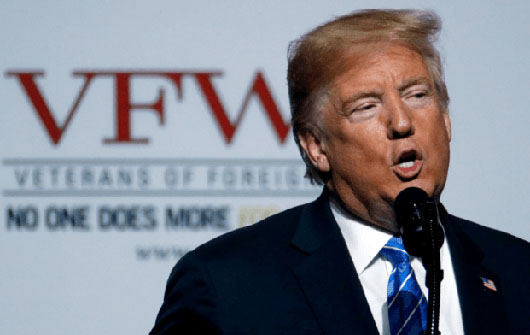by WorldTribune Staff, July 25, 2018
U.S. President Donald Trump, after trading harsh rhetoric with Iran’s president that was reminiscent of his “fire and fury” exchanges with North Korean leader Kim Jong-Un, said he is prepared to negotiate a new nuclear deal with the Islamic Republic.

“We’ll see what happens, but we’re ready to make a real deal, not the deal that was done by the previous administration, which was a disaster,” Trump said on July 24 in a speech to veterans in Missouri.
The U.S. president had warned Iran of “consequences the likes of which few throughout history have ever suffered before” after Iranian President Hassan Rouhani had warned Trump not to “play with the lion’s tail.”
Related: Khamenei condemns Trump peace plan, IRGC issues threat to block Strait of Hormuz, July 17, 2018
A former Defense Department official, in an op-ed for USA Today, said Iran continuing to escalate tensions with the U.S. would be a huge mistake.
“President Rouhani may threaten that a U.S.-Iran confrontation would be ‘the mother of all wars,’ but it would surely be a mother for Teheran,” James S. Robbins, a Defense Department official in the George W. Bush administration, wrote.
“If Iran’s navy took steps to close the Hormuz Strait by force, the American military response would go well beyond simply reopening the sea lanes. We could expect that Iran’s navy and port facilities would soon cease to exist. Iran’s military aircraft and bases would be obliterated. Any land-based missiles that could potentially threaten U.S. or allied shipping would be destroyed whenever they were detected. It would not entail a full-scale invasion of Iran but would mean substantial degradation of Iran’s military assets,” Robbins wrote.
Trump’s exchange with Rouhani “does not mean diplomacy with Iran is dead,” Robbins added. “We saw the same type of brinksmanship and mutual threats in the lead-up to the summit meeting with North Korea.”
In May, Trump withdrew from the nuclear deal “because it left too much unfinished,” Robbins wrote. “It did not address Iran’s illegal nuclear missile program, or the Islamic Republic’s destabilizing support for terrorism and insurgency in the Mideast and elsewhere.”
Additionally, Robbins noted, “the current round of sanctions on Teheran and diplomatic pressure on Iran’s trading partners is a means of drawing the Mullahs back to the bargaining table.”
Robbins continued: “We would hope that these dramatic exchanges are simply diplomatic posturing, and that Twitter wars will not translate into the real thing. But Iran should understand that President Trump really would rather negotiate a comprehensive deal than be forced to confront a military crisis in the gulf. On the other hand, if the mullahs decide to resort to armed conflict, it might serve as a welcome distraction from the swirl of American domestic politics. With midterm elections approaching not even Democrats would attempt to make the Iranian regime look like the good guys.”
Meanwhile, U.S. Defense Secretary Jim Mattis on July 24 voiced his own concerns about Iranian actions in the Middle East, including Teheran’s support for Syrian President Bashar Assad and for Houthi rebels fighting the government in Yemen.
“I think the president was making very clear that they’re on the wrong track,” Mattis said. “It’s time for Iran to shape up and show responsibility as a responsible nation. It cannot continue to show irresponsibility as a revolutionary organization that is intent on exporting terrorism, exporting disruption, across the region.”
Subscribe to Geostrategy-Direct __________ Support Free Press Foundation
